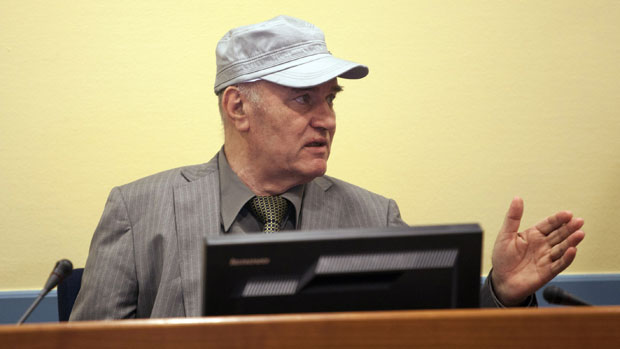Is Ratko Mladic guilty of war crimes and genocide in Bosnia?
The 'Butcher of Bosnia' begins his defence today, as court considers charges crimes against humanity

A free daily email with the biggest news stories of the day – and the best features from TheWeek.com
You are now subscribed
Your newsletter sign-up was successful
Lawyers for former Bosnian Serb army chief Ratko Mladic are set to begin their case today as the 72-year old appears before the International Criminal Tribunal for the former Yugoslavia (ICTY), but questions remain over whether the court will be able to secure a conviction against the man dubbed the "Butcher of Bosnia".
Mladic denies 11 charges of genocide and crimes against humanity dating back to the 1992-95 Bosnian war. Some of the charges relate to infamous events at Srebrenica and Sarajevo where thousands died.
The former general's lawyers have argued that there is not enough evidence to convict him of the most serious charges, including that of genocide.
The Week
Escape your echo chamber. Get the facts behind the news, plus analysis from multiple perspectives.

Sign up for The Week's Free Newsletters
From our morning news briefing to a weekly Good News Newsletter, get the best of The Week delivered directly to your inbox.
From our morning news briefing to a weekly Good News Newsletter, get the best of The Week delivered directly to your inbox.
So will the ICTY be successful in convicting one of its most high-profile suspects? And what exactly are the accusations against Mladic?
Who is Ratko Mladic?During the Bosnian War, General Mladic was the head of the Bosnian Serb army. Many say he was responsible for some of the conflict's worst atrocities, including the slaughter of 7,500 Bosnian Muslim men and boys at Srebrenica in 1995.
He was "a pioneer of the technique known as ethnic cleansing", says the BBC's Allan Little. Hundreds of thousands of non-Serbs fled their homes as the Bosnian Serb army attempted to establish an ethnically pure Serb state in Croatia and Bosnia.
Mladic was "fanatical but also fearless," Little says, "and this made him a folk hero among those he led".
A free daily email with the biggest news stories of the day – and the best features from TheWeek.com
What are the charges against Mladic?Mladic is accused of 11 charges related to his involvement in the Bosnian war. The charges that have been brought against him relate to the killings at Srebrenica, and to the forced expulsion of Muslim Bosniaks, Bosnian Croats and other non-Serb populations from villages and cities that came to be known as "ethnic cleansing".
Mladic is also charged with involvement in the siege of Sarajevo – a 44-month campaign that caused the death of 10,000 people.
What do his lawyers say?The defence says that Mladic was simply a soldier following orders, and say that there is simply not enough evidence to link him to the most serious crimes. They are also expected to point out that Mladic suffers from a condition that makes it impossible for him to "distinguish between truth and fiction", the BBC reports. Lawyers for the former general will be given 207 hours to present their case – the same amount of time allocated to the prosecution.
How has Mladic behaved in court?Throughout his trial, Mladic has maintained a defiant attitude. The Times's Europe Correspondent, David Charter notes one sinister moment between Mladic and one of the Mothers of Srebrenica group: "One of them caught his eye and drew her hand across her throat. He smiled back. He seemed to relax and even start to enjoy himself, leaning back in his chair, sticking his chin out and gesticulating".
In his appearances in court, Mladic has "showed he had lost none of his swagger," Time magazine says, "jauntily applauding his war crimes judges and giving them a thumbs up".
What happens next?The death penalty does not exist in the sphere of international justice, so if Mladic is found guilty the most severe punishment he can be given is life in prison.
The hearing will be broadcast on the tribunal's website, with a 30-minute delay.
-
 What is the endgame in the DHS shutdown?
What is the endgame in the DHS shutdown?Today’s Big Question Democrats want to rein in ICE’s immigration crackdown
-
 ‘Poor time management isn’t just an inconvenience’
‘Poor time management isn’t just an inconvenience’Instant Opinion Opinion, comment and editorials of the day
-
 Bad Bunny’s Super Bowl: A win for unity
Bad Bunny’s Super Bowl: A win for unityFeature The global superstar's halftime show was a celebration for everyone to enjoy
-
 Epstein files topple law CEO, roil UK government
Epstein files topple law CEO, roil UK governmentSpeed Read Peter Mandelson, Britain’s former ambassador to the US, is caught up in the scandal
-
 Iran and US prepare to meet after skirmishes
Iran and US prepare to meet after skirmishesSpeed Read The incident comes amid heightened tensions in the Middle East
-
 Israel retrieves final hostage’s body from Gaza
Israel retrieves final hostage’s body from GazaSpeed Read The 24-year-old police officer was killed during the initial Hamas attack
-
 China’s Xi targets top general in growing purge
China’s Xi targets top general in growing purgeSpeed Read Zhang Youxia is being investigated over ‘grave violations’ of the law
-
 Panama and Canada are negotiating over a crucial copper mine
Panama and Canada are negotiating over a crucial copper mineIn the Spotlight Panama is set to make a final decision on the mine this summer
-
 Why Greenland’s natural resources are nearly impossible to mine
Why Greenland’s natural resources are nearly impossible to mineThe Explainer The country’s natural landscape makes the task extremely difficult
-
 Iran cuts internet as protests escalate
Iran cuts internet as protests escalateSpeed Reada Government buildings across the country have been set on fire
-
 US nabs ‘shadow’ tanker claimed by Russia
US nabs ‘shadow’ tanker claimed by RussiaSpeed Read The ship was one of two vessels seized by the US military